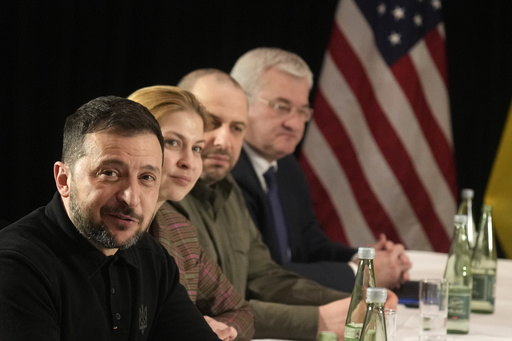MUNICH — In a recent statement, Ukrainian President Volodymyr Zelenskyy emphasized the necessity of obtaining “security guarantees” from other nations before engaging in negotiations with Russia to resolve the ongoing conflict that has persisted for three years. As discussions unfold, the U.S. administration is advocating for a rapid resolution to this significant confrontation.
Just prior to attending a high-stakes meeting with Vice President JD Vance at the Munich Security Conference, Zelenskyy expressed that he would be willing to meet Russian President Vladimir Putin only after a comprehensive agreement is established with U.S. President Donald Trump. The encounter between Vance and Zelenskyy lasted approximately 40 minutes but did not yield any substantial insights or resolutions concerning the resolution of this severe conflict, which is the deadliest in Europe since World War II.
Zelenskyy articulated his country’s longing for peace, stating, “We want peace very much. But we need real security guarantees.” Vance acknowledged the Trump administration’s commitment to fostering enduring peace between Ukraine and Russia, insisting that the objective is to bring the war to a halt. He highlighted the importance of preventing an unstable peace that could leave Eastern Europe vulnerable to future conflicts.
In a surprising turn, Trump revised the framework of U.S. support for Ukraine earlier this week during a conversation with Putin, indicating that the two leaders might convene soon to discuss a peace agreement. Trump later reassured Zelenskyy that he would be included in these discussions.
While addressing the conference, Vance conveyed his concerns to European officials regarding freedom of speech and the handling of illegal immigration, suggesting that a failure to respond to public sentiments could undermine support for their governments. “The threat that I worry the most about vis-à-vis Europe is not Russia. It’s not China. It’s not any other external actor,” he conveyed, emphasizing internal challenges to fundamental democratic values shared with the U.S.
The vice president also expressed apprehension about illegal immigration, elaborating on a recent assault in Munich, which involved a suspect who came to Germany as an asylum-seeker in 2016. This incident resulted in over 30 injuries and is believed to be related to Islamic extremism.
In separate discussions earlier, Vance reiterated to German President Frank-Walter Steinmeier, NATO Secretary-General Mark Rutte, and British Foreign Secretary David Lammy the need for NATO member nations to increase their defense spending, drawing attention to the ongoing responsibility of these countries to meet agreed-upon military expenditure targets.
Currently, 23 out of NATO’s 32 member countries are meeting the alliance’s goal of spending 2% of their GDP on defense, yet European leaders remain resistant to the idea that Europe relies excessively on U.S. help. They noted the continent’s prompt support for Ukraine following the Russian invasion in February 2022, with the U.S. contributing over $66 billion in military aid and allies providing an additional $60 billion.
Amid these discussions, Zelenskyy reported that a Russian drone targeted the containment structure at the Chernobyl Nuclear Power Plant in the Kyiv region. Fortunately, there were no corresponding increases in radiation levels, as confirmed by both Zelenskyy and the U.N. atomic agency. He viewed this drone strike as a direct message from Putin to the attendees of the Munich Security Conference.
Kremlin representatives refuted these claims, with officials indicating that Russia had not been invited to the conference for several years. On the broader stage, Trump has remained ambiguous regarding his specific strategies for engaging with both Ukraine and Russia, suggesting that any negotiations may require Ukraine to relinquish territory taken by Russia since its annexation of Crimea in 2014.
Zelenskyy remarked that prior to these developments, neither Trump nor President Biden’s administration had shown a genuine commitment to Ukraine’s NATO aspirations. The evolving dynamics of the U.S. administration, particularly hints from Trump regarding limiting military assistance, have raised questions about maintaining NATO’s post-WWII security foundations.
Following discussions with various European leaders, including French President Emmanuel Macron, there are emerging plans among some nations to deploy troops to Ukraine to help uphold a potential peace treaty with Russia. Macron expressed his desire for Europe to take greater initiative in assuring its security, aiming for a robust and independent European defense strategy.
As the situation evolves, the international community watches closely how these negotiations unfold and their potential impacts on European security and stability in the long term.




